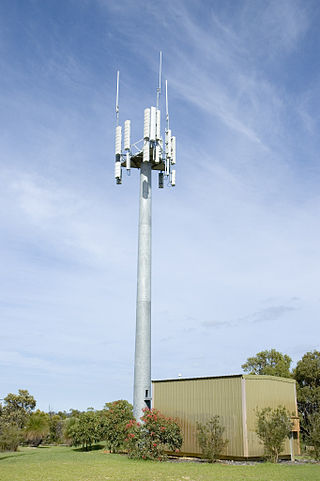Related Research Articles
Telecommunications in Burkina Faso include radio, television, fixed and mobile telephones, and the Internet.
India's telecommunication network is the second largest in the world by number of telephone users with over 1.1 billion subscribers as of December 2023. It has one of the lowest call tariffs in the world enabled by multiple large-scale telecom operators and the ensuant hyper-competition between them. India has the world's second largest Internet user-base with over 904 million broadband internet subscribers as of December 2023.
Telecommunications in Pakistan describes the overall environment for the mobile telecommunications, telephone, and Internet markets in Pakistan.
Telecommunications in Tanzania include radio, television, fixed and mobile telephones, and the Internet available in mainland Tanzania and the semiautonomous Zanzibar archipelago.
Modern telecommunications in Thailand began in 1875 with the deployment of the first telegraph service. Historically, the development of telecommunication networks in Thailand were in the hands of the public sector. Government organisations were established to provide telegraph, telephone, radio, and television services, and other government agencies, especially the military, still control a large estate of radio and television spectra. Private telecommunication operators initially acquired concession agreements with state enterprises. For mobile phone services, all the concessions have been amended by successive government to last 25 years have gradually ended in 2015. For other services, the concession terms and conditions vary, ranging from one to fifteen years. Nearly all of the concessions are build-operate-transfer (BTO) contracts. The private investor has to build all the required facilities and transfer them to the state before they can operate or offer services to public.

Iran's telecommunications industry is almost entirely state-owned, dominated by the Telecommunication Company of Iran (TCI). Fixed-line penetration in 2004 was relatively well-developed by regional standards, standing at 22 lines per 100 people, higher than Egypt with 14 and Saudi Arabia with 15, although behind the UAE with 27. Iran had more than 1 mobile phone per inhabitant by 2012.

The telecom sector in Bangladesh is rapidly emerging. Bangladesh Telecommunication Regulatory Commission (BTRC) is the regulatory authority for this sector, overseeing licensing, policy, etc.

Mobile telephony is the provision of telephone services to mobile phones rather than fixed-location phones. Telephony is supposed to specifically point to a voice-only service or connection, though sometimes the line may blur.

Millicom International Cellular SA is a Luxembourgish fixed line and mobile telecommunications services provider operating in Latin America operating under the Tigo brand. Its main shareholder is Xavier Niel, a French billionaire who owns 40% of the company.
Safaricom PLC is a listed Kenyan mobile network operator headquartered at Safaricom House in Nairobi, Kenya. It is the largest telecommunications provider in Kenya, and one of the most profitable companies in the East and Central Africa region. The company offers mobile telephony, mobile money transfer, consumer electronics, ecommerce, cloud computing, data, music streaming, and fibre optic services. It is most renowned as the home of M-PESA, a mobile banking SMS-based service.
Vodacom Tanzania Limited is Tanzania's leading cellular network company. As of December 2020, Vodacom Tanzania had over 15.6 million customers and was the largest wireless telecommunications network in Tanzania. Vodacom Tanzania is the second telecom company in Africa, after Vodacom, to switch on its 3G High-Speed Downlink Packet Access (HSDPA) which was available only in Dar Es Salaam in early 2007.

Airtel Tanzania Limited is the third-largest mobile network operator in Tanzania operated by Airtel Africa, which is a subsidiary of Bharti Airtel of India, behind Vodacom Tanzania and Tigo Tanzania. As of September 2017, Airtel Tanzania had 10.6 million voice subscribers. As of December 2017 according to data provided by the Tanzania Communications Regulatory Authority, Airtel Tanzania controlled 27.1 percent of Tanzania's mobile telephone market by customer numbers, at that time estimated at 10.86 million.
ALBtelecom Mobile, formerly known as Eagle Mobile, was a mobile communication company that operates in Albania. Back in March 2008, it was first founded as a subsidiary of ALBtelecom, which had been privatized in October 2007, with a majority of shares sold by the Albanian government to a consortium of two Turkish companies; Calik Holding and Türk Telekom. Calik possesses 80% of the company and Türk Telekom the remaining 20%.
Internet access in Tanzania, a country in East Africa, began in 1995. Within 5 years, 115,000 people were connected to the Internet. Since then, there has been significant growth.
References
- ↑ Reuters (23 February 2018). "Tanzania internet users hit 23 million; 82 per cent go online via phones". The EastAfrican Quoting Reuters . Nairobi. Retrieved 25 February 2018.
{{cite web}}:|author=has generic name (help) - 1 2 3 "QUARTERLY COMMUNICATIONS STATISTICS: October - December 2018 Operators' Submissions" (PDF). Tanzania Communications Regulatory Authority. Retrieved 10 February 2019.